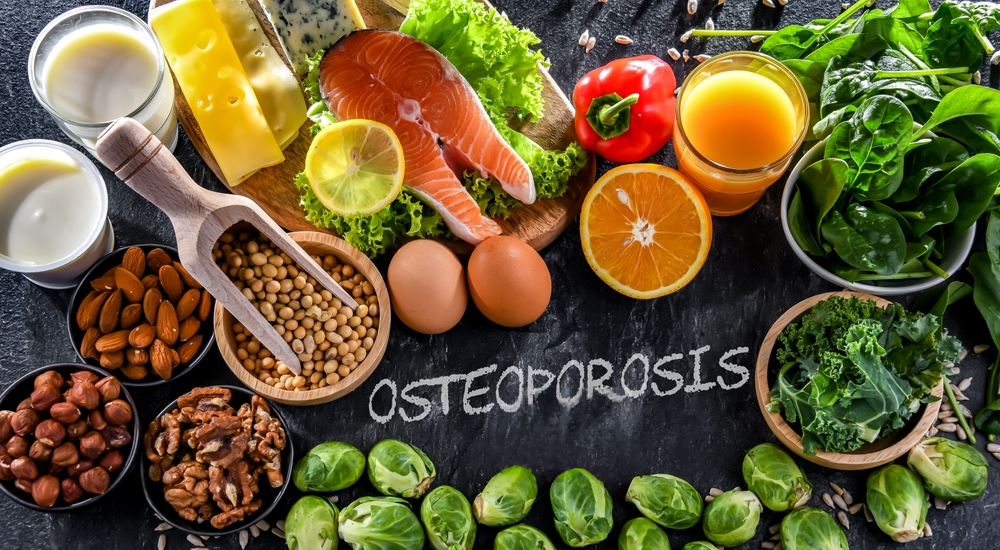A Nutritional Approach to Osteoporosis
Osteoporosis, characterized by weak and brittle bones, is a condition that affects millions worldwide. While factors like age, genetics, and physical activity play significant roles in bone health, nutrition stands as a cornerstone in the prevention and management of osteoporosis. In this article, we’ll explore the vital role of nutrition in combating osteoporosis, focusing on an anti-inflammatory diet, the importance of calcium intake, and the impact of vitamin D.
The Power of an Anti-Inflammatory Diet
An anti-inflammatory diet not only benefits overall health but also plays a crucial role in bone health. Chronic inflammation can accelerate bone loss and increase the risk of fractures. By incorporating anti-inflammatory foods such as fruits, vegetables, whole grains, nuts, and fatty fish into your diet, you can help reduce inflammation and promote bone health.
Fruits and Vegetables: Nature’s Bone Protectors
Research suggests that higher fruit and vegetable intake is associated with a lower risk of fractures. These nutrient-rich foods are packed with vitamins, minerals, and antioxidants essential for bone health. Aim to incorporate a colorful variety of fruits and vegetables into your meals to provide your body with the nutrients it needs to build and maintain strong bones.
The Calcium Connection
Calcium is a vital mineral that plays a central role in bone health. Adults aged 50 and older should aim for a daily calcium intake of 1200 mg to support bone strength and density. However, simply consuming calcium-rich foods may not be enough. To optimize calcium absorption, it’s important to consume it in small, separate doses throughout the day.
Sources of Calcium
- Dairy products such as milk, cheese, and yogurt
- Dark leafy greens like collard greens and spinach
- Sesame seeds
- Molasses
- Tofu
- White beans
Incorporating these calcium-rich foods into your diet can help ensure you’re meeting your daily calcium needs and supporting your bone health.
The Role of Vitamin D
Vitamin D is essential for calcium absorption and bone mineralization. Without adequate vitamin D levels, your body may struggle to absorb calcium effectively, increasing the risk of bone loss and fractures. To optimize bone health, it’s crucial to ensure you’re getting enough vitamin D through sun exposure, dietary sources, or supplements.
Check Your Vitamin D Levels
Since vitamin D plays a crucial role in calcium absorption, it’s essential to monitor your vitamin D levels regularly, especially if you’re at risk of osteoporosis. Speak to your healthcare provider about getting your vitamin D levels checked and discuss supplementation options if necessary.
In conclusion, nutrition plays a vital role in the prevention and management of osteoporosis. By following an anti-inflammatory diet, prioritizing calcium-rich foods, and ensuring adequate vitamin D intake, you can nourish your bones and support long-term bone health. Remember to consult with your healthcare provider or a registered dietitian for personalized nutrition advice tailored to your specific needs and circumstances.
For More Information on Nutrition from RVNAhealth
If you’re interested in learning more or need help with osteoporosis and nutrition, our RVNAhealth Nutritionist, Monica Marcello, RD, regularly holds informational presentations and cooking classes out in the communities we serve. You can also connect with Monica by signing up for her monthly nutrition newsletter or by contacting her with questions at nutrition@rvnahealth.org.

About Monica: Monica Marcello, MS, RD is RVNAhealth’s registered dietitian and nutrition educator who promotes holistic health, longevity, and quality of life. Monica’s areas of expertise include disease prevention and treatment for many chronic and acute conditions.



